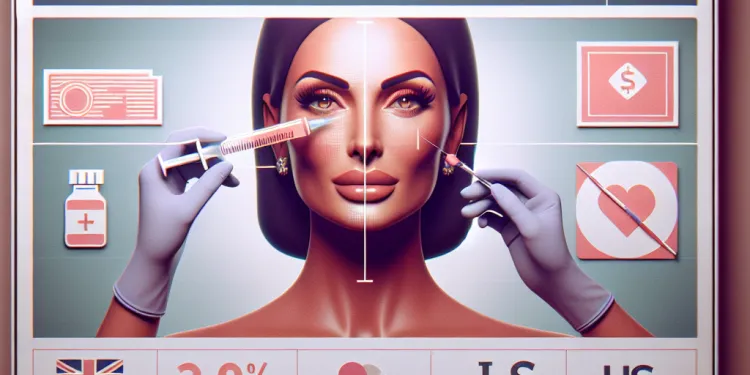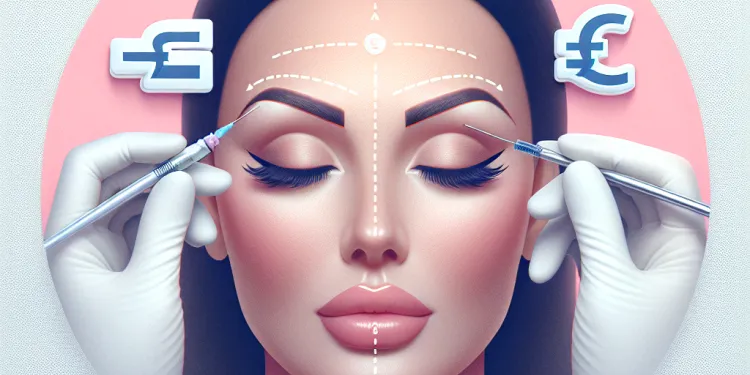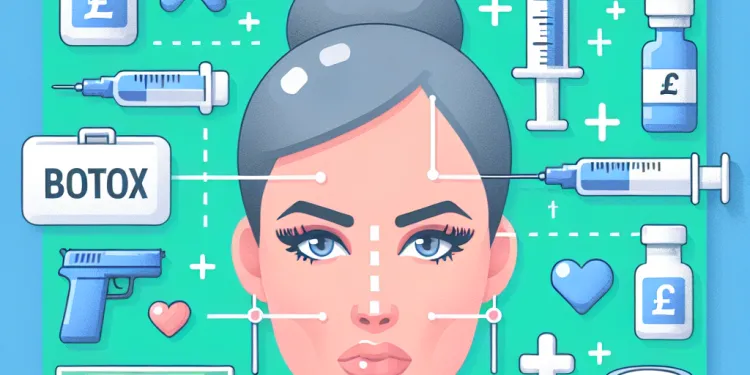
Find Help
More Items From Ergsy search
-

What should I do if I experience side effects after a Botox injection?
Relevance: 100%
-

What are the side effects of Botox?
Relevance: 98%
-

What are the side effects of Botox?
Relevance: 93%
-

Does Botox injection hurt?
Relevance: 85%
-

Is Botox safe?
Relevance: 68%
-

Is Botox safe?
Relevance: 66%
-

Are there any long-term effects of using Botox?
Relevance: 64%
-

Does Botox hurt?
Relevance: 63%
-

Can Botox cause serious health issues?
Relevance: 63%
-

Can Botox help with excessive sweating?
Relevance: 62%
-

What is Botox?
Relevance: 61%
-

Can Botox be used for migraines?
Relevance: 61%
-

How long do the effects of Botox last?
Relevance: 61%
-

How does Botox work?
Relevance: 60%
-

Can I get Botulism from Botox Treatments?
Relevance: 58%
-

What is Botox used for?
Relevance: 58%
-

How does Botox work if it's related to botulism toxin?
Relevance: 55%
-

Can Botox lift my eyebrows?
Relevance: 54%
-

What are the common uses of Botox?
Relevance: 54%
-

What is Botox made from?
Relevance: 53%
-

Who can administer Botox?
Relevance: 53%
-

Can anyone get Botox treatments?
Relevance: 53%
-

Can Botox be used for treating conditions other than wrinkles?
Relevance: 52%
-

What areas can be treated with Botox?
Relevance: 51%
-

How long does Botox last?
Relevance: 51%
-

Can I get Botox while pregnant?
Relevance: 50%
-

Is Botox vegan?
Relevance: 50%
-

How should I choose a provider for Botox treatments?
Relevance: 50%
-

Are there any side effects of the winter flu jab?
Relevance: 50%
-

What are the side effects of Ozempic?
Relevance: 49%
-

What should I do if I experience side effects from a vaccine?
Relevance: 48%
-

What are the common side effects of vaccines?
Relevance: 48%
-

What are the common side effects of Ozempic?
Relevance: 48%
-

What are common side effects of Wegovy?
Relevance: 48%
-

Are there any side effects to the flu vaccine?
Relevance: 47%
-

What are common side effects of Ozempic?
Relevance: 47%
-

Will I experience side effects from the COVID jab?
Relevance: 47%
-

How often should I get Botox treatments?
Relevance: 46%
-

Are GLP-1 medications injectable?
Relevance: 46%
-

How soon will I see results from Botox?
Relevance: 45%
Understanding Botox Side Effects
Botox, a popular cosmetic treatment in the UK, is generally considered safe when administered by qualified professionals. However, like any medical procedure, there is a possibility of experiencing side effects. Understanding what to expect and how to respond can help you manage these effects effectively.
Common Side Effects
It is common to experience minor side effects after a Botox injection. These can include bruising, redness, and swelling at the injection site, mild headache, or temporary facial weakness. These effects usually subside within a few days. If you experience any of these, there is generally no cause for alarm.
Immediate Actions to Take
In the case of mild side effects, it is advisable to avoid massaging or rubbing the treated area to prevent the Botox from spreading to unintended muscles. Try applying a cold compress to reduce swelling and keep the head elevated to minimize bruising. Over-the-counter pain relief, such as paracetamol, can help with headaches, but always follow package directions and consult your GP if in doubt.
When to Contact Your Practitioner
If you experience more severe side effects, such as difficulty breathing, swallowing, or speaking, drooping eyelids, or muscle weakness beyond the injection area, contact your healthcare provider immediately. These could indicate that the Botox has spread to other areas. It is crucial to consult your practitioner, preferably the one who administered the treatment, as they will have detailed knowledge of your procedure.
Documenting Your Symptoms
Should you decide to contact your practitioner or GP, it may be helpful to document your symptoms. Take note of their onset, duration, intensity, and any changes. Photos can also be useful, particularly if you are experiencing visual symptoms such as swelling or redness.
Follow-Up Consultation
A follow-up appointment might be necessary if side effects persist or cause distress. During this session, your practitioner can assess the situation and provide further guidance or treatments to address any complications.
Preventing Future Side Effects
To minimize the risk of future side effects, ensure that Botox is administered by a qualified and experienced practitioner. Verify their credentials and discuss any previous health issues or medications with them before your treatment. Additionally, adhere to all pre-and post-care instructions provided by your practitioner.
Conclusion
While Botox is generally safe, being aware of potential side effects and knowing how to respond can ensure a smoother experience. Always prioritize seeking professional advice for any concerns to maintain both your appearance and health safely.
Understanding Botox Side Effects
Botox is a popular beauty treatment in the UK. It is usually safe when done by trained experts. But, like any medical treatment, there can be side effects. Knowing what to expect and what to do can help you handle them better.
Common Side Effects
After getting Botox, you might have small side effects. These can be bruising, redness, swelling where you got the injection, a mild headache, or temporary weakness in your face. These usually go away in a few days. If you have these, don’t worry too much.
Immediate Actions to Take
If you have mild side effects, don’t massage or rub the area where you had Botox. This stops it from spreading. Use a cold pack to reduce swelling. Keep your head up to lessen bruising. If you have a headache, you can take medicine like paracetamol. Always follow the instructions on the package and ask your doctor if you’re unsure.
When to Contact Your Practitioner
If you have serious side effects, like trouble breathing, swallowing, or speaking, drooping eyelids, or weak muscles outside the injection area, call your doctor right away. This may mean Botox is affecting other areas. It’s important to talk to the person who gave you the treatment, as they know your case best.
Documenting Your Symptoms
If you need to call your doctor or GP, it’s a good idea to write down your symptoms. Note when they started, how long they last, how strong they are, and any changes. Taking photos can help, especially if you notice swelling or redness.
Follow-Up Consultation
If your side effects continue or upset you, you might need another visit to your doctor. They can check your condition and suggest more help or treatments if needed.
Preventing Future Side Effects
To avoid future side effects, have Botox done by a skilled and experienced practitioner. Check their qualifications and talk to them about any past health problems or medicines you take before your treatment. Also, follow all the advice given before and after your treatment.
Conclusion
Botox is mainly safe, but knowing about side effects and how to handle them can make things easier. Always get professional help if you have any worries to keep your looks and health safe.
Frequently Asked Questions
What should I do if I experience swelling after a Botox injection?
Swelling is a common side effect. Apply a cold compress to the affected area and avoid rubbing or massaging it. Contact your healthcare provider if it doesn't subside in a few days.
Is it normal to have bruising after Botox?
Yes, bruising can occur at the injection site. It should resolve within a week. Avoid blood thinners and alcohol after the procedure to minimize bruising.
How long do Botox side effects last?
Most side effects such as redness, swelling, and bruising are temporary and should resolve within a few days to a week.
When should I see a doctor for side effects after Botox?
If you experience severe side effects like difficulty swallowing, speaking, or breathing, seek medical attention immediately.
What can I do to reduce discomfort after a Botox injection?
You can use over-the-counter pain relief if needed, and apply a cold compress to reduce swelling. Rest and avoid strenuous activities for the first 24 hours.
Can Botox cause headaches?
Yes, some people experience headaches after Botox injections. This usually resolves within a few days.
Is it normal to feel dizzy after Botox?
Dizziness can be a side effect, though it's less common. If it persists or is severe, consult your doctor.
What should I avoid doing after a Botox injection?
Avoid lying down for 4 hours, touching or massaging the injection area, vigorous exercise, and alcohol consumption for the rest of the day.
Can I reduce the risk of side effects from Botox?
Choose a qualified and experienced healthcare provider. Follow all pre and post-care instructions they provide.
What happens if I experience drooping eyelids after Botox?
Eyelid drooping can occur if the Botox migrates. This is temporary but can last a few weeks. Contact your provider for advice.
How can I alleviate my anxiety about side effects?
Discuss your concerns with your healthcare provider before the treatment. Knowing what to expect can help. Also, ensure you have chosen a reputable practitioner.
What should I do if I have muscle weakness in areas treated with Botox?
Mild, temporary muscle weakness can happen. If you are concerned or if it affects daily life, contact your doctor.
Are there any over-the-counter medications I can take for side effects?
For mild pain or headaches, you may take acetaminophen. Avoid aspirin and other blood thinners immediately after the injection.
How common are allergic reactions to Botox?
Allergic reactions to Botox are rare but possible. Seek immediate medical care if you experience hives, swelling, or breathing difficulties.
Can Botox affect facial expressions?
Botox can modify facial expressions, especially if overdone. This should be discussed before treatment with your practitioner.
Is it safe to apply makeup after Botox treatment?
Avoid applying makeup for at least 4 hours post-treatment to minimize risk of infection.
What actions should I take if I notice an uneven appearance?
Contact your injection provider. They may adjust the treatment with follow-up care if needed.
Can I sleep after getting Botox?
Refrain from lying down or sleeping for at least 4 hours after receiving Botox.
How can I track the side effects of Botox effectively?
Keep a journal of any symptoms or side effects with dates and times to discuss with your provider during follow-up.
What long-term side effects should I report to my doctor?
Discuss any prolonged muscle weakness, atypical sensations or any new symptoms persisting beyond a few weeks with your healthcare provider.
What to Do if You Have Swelling After Botox
Did you get a Botox injection and now you have swelling?
Here’s what you can do:
- Stay calm: Swelling is usually normal and can go away on its own.
- Use a cold pack: Put a cold pack on the swollen area to help reduce swelling. Do this for 10-15 minutes.
- Don't touch or rub: Keep your hands away from the area. Rubbing can make the swelling worse.
- Drink water: Drinking water can help your body heal faster.
- Call your doctor: If the swelling doesn't go away or if you're worried, call your doctor for help.
Ask someone you trust to help read this or call a doctor if you need help.
Swelling can happen often. Put a cold pack on the swollen area. Don’t rub or touch it too much. If the swelling doesn't go down in a few days, call your doctor.
Can you get bruises after Botox?
Yes, it is normal to get small bruises after having Botox. Here are some tips that might help:
- Put a cold pack (like an ice pack) on the bruises to help them feel better.
- Try not to rub or press on the bruised area.
- If you feel worried, talk to a doctor who can give you more advice.
Yes, you might get a bruise where you had the injection. It should go away in about a week. To help stop bruising, don’t take medicine that makes your blood thin, and don’t drink alcohol after the injection.
How long do Botox side effects last?
Botox is a medicine that helps with wrinkles. Sometimes it can have effects like a headache or feeling sick.
These side effects usually go away in a few days.
If you still feel bad after a week, you should talk to a doctor.
Here are some tips to help:
- Rest and drink water.
- Ask someone to help you with medicine.
- Use an ice pack if you have swelling.
Most side effects like red skin, swelling, and bruises go away in a few days to a week.
When should I visit a doctor after having Botox?
Botox can cause some side effects. Here are signs to see a doctor:
- Your eyelids droop.
- You have trouble seeing.
- Your face swells up.
- You feel very weak.
- You have trouble breathing.
If you feel worried, it's okay to talk to a doctor.
Ask someone you trust to help you or to come with you.
You can also use tools like picture charts to help explain your feelings or symptoms.
If you have bad side effects, like trouble swallowing, talking, or breathing, get help from a doctor right away.
How can I feel better after getting Botox?
You can use medicine from the store to help with pain. Put something cold on the sore area to make the swelling go down. Rest and do not do hard activities for the first day.
Does Botox give you headaches?
Botox is a treatment some people use to make wrinkles go away. But can it make your head hurt? Let's see!
- Sometimes, Botox can make people get headaches.
- Not everyone gets a headache from Botox.
- If you get a headache after Botox, you should tell your doctor.
Here are some tips to help read better:
- Use your finger to point to each word as you read.
- Read slowly and take your time.
- If a word is hard, ask someone to help you.
Yes, some people get headaches after getting Botox shots. The headaches usually go away in a few days.
Is it okay to feel dizzy after Botox?
Sometimes people can feel dizzy after getting Botox. This can be normal for some.
If you feel dizzy, it can help to:
- Sit or lie down until you feel better.
- Drink some water.
- Tell an adult you trust about how you feel.
If you are worried, or the feeling does not go away, tell a doctor or nurse.
Feeling dizzy can happen, but it's not very common. If you feel dizzy for a long time or it makes you feel very bad, talk to your doctor.
Here are some things you can do to help:
- Rest for a little while. Sit or lie down.
- Drink some water.
- Move slowly when you stand up.
What should I not do after getting Botox?
Here are some tips for after you get Botox:
- Do not touch or rub the area where you got the injection.
- Try not to lie down for 4 hours after your injection.
- Do not exercise hard or do heavy lifting for 24 hours.
- Avoid taking hot baths or using a sauna for a day.
If you need help, you can:
- Ask a friend or family member to remind you what to do.
- Set alarms on your phone for when you can do things again.
- Write down the steps to follow on a piece of paper.
These tips can help you take care of yourself after getting Botox.
After your shot, don't lie down for 4 hours. Also, don't touch or rub where you got the shot. Try not to do hard exercise or drink alcohol for the rest of the day.
How can I make Botox safer?
Pick a doctor or nurse who knows what they are doing and has done it before. Listen and do what they tell you before and after your care.
What should I do if my eyelids droop after Botox?
If your eyelids start to droop after getting Botox, don't worry. This can happen sometimes.
Here are some steps you can follow:
- Tell your doctor or nurse. They can help you understand what to do next.
- You might need to wait a little. Often, the drooping gets better by itself after a few weeks.
- If you're worried, ask a friend or family member to go with you to the doctor. It's okay to ask for help.
You can also try these tools to make reading easier:
- Read out loud.
- Use a finger or a pen to follow the words.
If your eyelid drops after Botox, it might be because the Botox moved. This won't last forever, but it could take a few weeks to go away. Talk to your doctor for help.
How can I feel less worried about side effects?
Talk to your doctor before you start the treatment. It helps to know what will happen. Make sure you go to a good and trusted doctor.
What should I do if my muscles feel weak after getting a Botox treatment?
Sometimes your muscles might feel weak for a short time. If you are worried or it makes daily activities hard, talk to your doctor.
Can I buy medicine to help with side effects?
Yes, you can buy some medicines at the store without a doctor's note. They might help with side effects.
If you're not sure which one to get, it's good to ask a pharmacist or an adult you trust. They can help you choose the right medicine.
It's also important to follow the instructions on the medicine box.
If the side effects do not get better or you feel worse, tell a doctor or nurse.
If you have a little pain or a headache, you can take medicine called acetaminophen. Do not take aspirin or other medicines that make your blood thinner right after you get the injection.
How often do people have allergies to Botox?
Botox can sometimes cause allergies, but it doesn't happen a lot.
If you are worried, talk to a doctor. They can help you know more.
Before getting Botox, you can ask about other things that might work better for you.
Allergic reactions to Botox do not happen often, but they can happen. Go to the doctor right away if you get itchy bumps, swelling, or if you find it hard to breathe.
Here are some helpful tips: - **Highlighting Important Words**: Use a highlighter to mark words like "allergy" or "doctor" to remember them better. - **Reading Slowly**: Read one sentence at a time and take breaks if needed. - **Buddy Reading**: Read with a friend or family member. They can help you understand tricky parts.Can Botox change how your face looks?
Botox is a medicine that can make your face muscles relax. It helps to make wrinkles go away.
Sometimes, Botox can make it hard to show how you feel with your face. This means your smile or frown might look different.
It's a good idea to talk to a doctor before using Botox. They can tell you what to expect and how it might change your face.
Drawing pictures or using apps with faces can help you see different facial expressions.
Botox can change how your face looks, especially if you use too much. You should talk about this with your doctor before you get the treatment.
Can I put on makeup after getting Botox?
After you get Botox, it's best to wait a bit before putting on makeup. This is to make sure your skin stays safe. Here are some tips that might help:
- Wait a little: Give your skin a few hours to rest after Botox before using makeup.
- Be gentle: Use soft brushes or clean fingers to apply makeup. Don't push too hard on your skin.
- Ask an expert: If you're not sure, you can ask the person who did your Botox for advice.
Using these tips can help keep your skin healthy after Botox.
Wait at least 4 hours after your treatment before you put on makeup. This helps keep your skin safe from infection.
What should I do if things look uneven?
If something doesn't look the same on both sides or in different parts, here are some steps you can follow:
- Look closely to see what's different.
- Tell a trusted adult about what you see.
- If you're worried, it’s okay to ask for help.
- Using a mirror can help you see better.
- Draw a picture of what you see. It might help you explain your worry.
Remember, it's always okay to ask questions or talk about your worries!
Talk to the person who gave you the injection. They might change your treatment or help you more if you need it.
Can I sleep after having Botox?
Yes, you can sleep after getting Botox. Here are some tips to help you:
- Try not to touch your face for a few hours.
- Sleep on your back if you can. This keeps your face safe.
- Use a soft pillow for comfort.
Remember to follow what your doctor says for the best results.
Do not lie down or sleep for at least 4 hours after you get Botox.
How can I keep track of Botox side effects?
Here is how you can keep track of how you feel after Botox:
- Write down any changes. Use a notebook or app to note how you feel.
- Ask someone for help. A friend or family member can help you remember.
- Take photos. This helps you see any changes.
- Use a calendar. Mark the days you feel different.
These steps can make it easier to know how Botox affects you. If you feel worried, talk to a doctor.
Write down how you feel in a diary. Note any bad feelings or problems. Remember to include the date and time. Show this to your doctor when you see them next.
What problems should I tell my doctor about after a long time?
Talk to your doctor if your muscles feel weak for a long time, or if you feel strange things in your body. Also, tell them about any new problems that don't go away after a few weeks.
Useful Links
Have you found an error, or do you have a link or some information you would like to share? Please let us know using the form below.
-->
This website offers general information and is not a substitute for professional advice.
Always seek guidance from qualified professionals.
If you have any medical concerns or need urgent help, contact a healthcare professional or emergency services immediately.
Some of this content was generated with AI assistance. We’ve done our best to keep it accurate, helpful, and human-friendly.
- Ergsy carfully checks the information in the videos we provide here.
- Videos shown by Youtube after a video has completed, have NOT been reviewed by ERGSY.
- To view, click the arrow in centre of video.
- Most of the videos you find here will have subtitles and/or closed captions available.
- You may need to turn these on, and choose your preferred language.
- Go to the video you'd like to watch.
- If closed captions (CC) are available, settings will be visible on the bottom right of the video player.
- To turn on Captions, click settings .
- To turn off Captions, click settings again.
More Items From Ergsy search
-

What should I do if I experience side effects after a Botox injection?
Relevance: 100%
-

What are the side effects of Botox?
Relevance: 98%
-

What are the side effects of Botox?
Relevance: 93%
-

Does Botox injection hurt?
Relevance: 85%
-

Is Botox safe?
Relevance: 68%
-

Is Botox safe?
Relevance: 66%
-

Are there any long-term effects of using Botox?
Relevance: 64%
-

Does Botox hurt?
Relevance: 63%
-

Can Botox cause serious health issues?
Relevance: 63%
-

Can Botox help with excessive sweating?
Relevance: 62%
-

What is Botox?
Relevance: 61%
-

Can Botox be used for migraines?
Relevance: 61%
-

How long do the effects of Botox last?
Relevance: 61%
-

How does Botox work?
Relevance: 60%
-

Can I get Botulism from Botox Treatments?
Relevance: 58%
-

What is Botox used for?
Relevance: 58%
-

How does Botox work if it's related to botulism toxin?
Relevance: 55%
-

Can Botox lift my eyebrows?
Relevance: 54%
-

What are the common uses of Botox?
Relevance: 54%
-

What is Botox made from?
Relevance: 53%
-

Who can administer Botox?
Relevance: 53%
-

Can anyone get Botox treatments?
Relevance: 53%
-

Can Botox be used for treating conditions other than wrinkles?
Relevance: 52%
-

What areas can be treated with Botox?
Relevance: 51%
-

How long does Botox last?
Relevance: 51%
-

Can I get Botox while pregnant?
Relevance: 50%
-

Is Botox vegan?
Relevance: 50%
-

How should I choose a provider for Botox treatments?
Relevance: 50%
-

Are there any side effects of the winter flu jab?
Relevance: 50%
-

What are the side effects of Ozempic?
Relevance: 49%
-

What should I do if I experience side effects from a vaccine?
Relevance: 48%
-

What are the common side effects of vaccines?
Relevance: 48%
-

What are the common side effects of Ozempic?
Relevance: 48%
-

What are common side effects of Wegovy?
Relevance: 48%
-

Are there any side effects to the flu vaccine?
Relevance: 47%
-

What are common side effects of Ozempic?
Relevance: 47%
-

Will I experience side effects from the COVID jab?
Relevance: 47%
-

How often should I get Botox treatments?
Relevance: 46%
-

Are GLP-1 medications injectable?
Relevance: 46%
-

How soon will I see results from Botox?
Relevance: 45%


